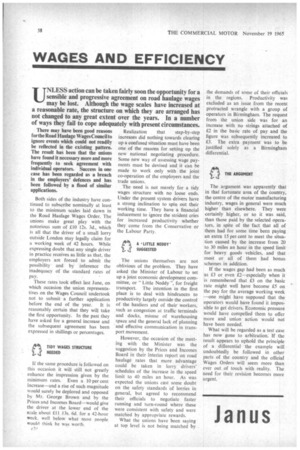WAGES AND EFFICIENCY
Page 60

If you've noticed an error in this article please click here to report it so we can fix it.
UNLESS action can be taken fairly soon the opportunity for a sensible and progressive agreement on road haulage wages may be lost. Although the wage scales have increased at a reasonable rate, the structure on which they are arranged has not changed to any great extent over the years. In a number of ways they fail to cope adequately with present circumstances.
There may have been good reasons for the Road Haulage Wages Council to ignore events which could not readily be reflected in the existing pattern. The result has been that the unions have found it necessary more and more frequently to seek agreement with individual operators. Success in one case has been regarded as a breach in the employers' defences and has been followed by a flood of similar applications.
Both sides of the industry have continued to subscribe nominally at least to the minimum scales laid down in the Road Haulage Wages Order. The unions make great play with the notorious sum of £10 12s. 3d., which is all that the driver of a small lorry outside London may legally claim for a working week of 42 hours. While expressing doubt that any single driver in practice receives as little as that, the employers are forced to admit the possibility and by inference the inadequacy of the standard rates of pay.
These rates took effect last June, on which occasion the union representatives on the Wages Council undertook not to submit a further application before the end of the year. It is reasonably certain that they will take the first opportunity. In the past they have asked for a general increase and the subsequent agreement has been expressed in shillings or percentages.
TIDY WAGES STRUCTURE NEEDED
If the same procedure is followed on this occasion it will still not greatly enhance the impression given by the minimum rates. Even a 10 per cent increase—and a rise of such magnitude would surely be deplored and opposed by Mr. George Brown and by the Prices and Incomes Board—would give the driver at the lower end of the scale about £11 13s. 6d. for a 42-hour week, well below what most people would think he was worth.
0-4 Realization that step-by-step increases did nothing towards clearing up a confused situation must have been one of the reasons for setting up the new national negotiating procedure. Some new way of assessing wage payments must be devised and it can be made to work only with the joint co-operation of the employers and the trade unions.
The need is not merely for a tidy wages structure with no loose ends. Under the present system drivers have a strong inclination to spin out their working time. They have a financial inducement to ignore the strident cries for increased productivity whether they come from the Conservative or the Labour Party.
A 'LITTLE REDDY' SUGGESTED
The unions themselves are not oblivious of the problem. They have asked the Minister of Labour to set up a joint economic development committee, or "Little Neddy ", for freight transport. The intention in the first place is to deal with hindrances to productivity largely outside the control of the hauliers and of their workers, such as congestion at traffic terminals and docks, misuse of warehousing space and the general lack of planning and effective communication in transport movement.
However, the occasion of the meeting with the Minister was the suggestion by the Prices and Incomes Board in their interim report on road haulage rates that more advantage could be taken in lorry drivers' schedules of the increase in the speed limit to 40 miles an hour. As was expected the unions cast some doubt on the safety standards "of lorries in general, but agreed to recommend their officials to negotiate faster running and turn-round where these were consistent with safety and were matched by appropriate rewards.
What the unions have been saying at top level is not being matched by the demands of some of their officials in the regions. Productivity was excluded as an issue from the recent protracted wrangle with a group of operators in Birmingham. The request from the union side was for an increase with no strings attached of £2 in the basic rate of pay and the figure was subsequently increased to £3. The extra payment was to be justified solely as a Birmingham differential.
THE ARGUMENT
The argument was apparently that in that fortunate area of the country, the centre of the motor manufacturing industry, wages in general were much higher than elsewhere. They were certainly higher, or so it was said, than those paid by the selected operators, in spite of the fact that all of them had for some time been paying an extra 15 per cent to meet the situation caused by the increase from 20 to 30 miles an hour in the speed limit for heavy goods vehicles, and that most or all of them had bonus schemes in addition.
If the wages gap had been as much as £3 or even £2—especially when it is remembered that £3 on the basic rate might well have become £5 on the pay for the average working week —one might have supposed that the operators would have found it impossible to get drivers. Economic pressure would have compelled them to offer more and union action would not have been needed.
What will be regarded as a test case has now gone to arbitration. If the result appears to uphold the principle of a differential the example will undoubtedly be followed in other parts of the country and the official Wages Orders will seem more than ever out of touch with reality. The need for their revision becomes more urgent.
















































































































































